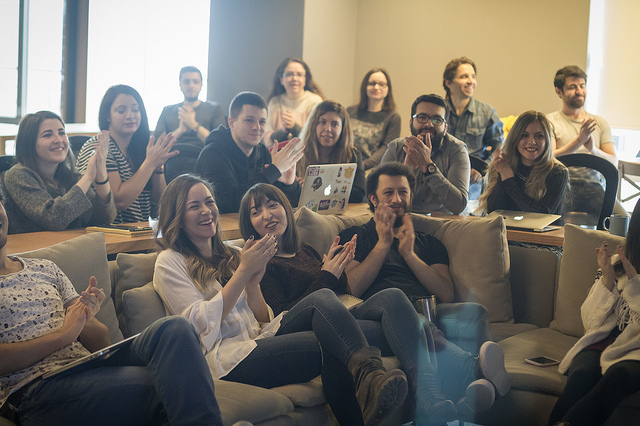Common sense tells us that happy, collaborative teams are productive teams.
Research backs it up, too.
But when leaders or managers utter the words “team-building,” most people want to run for the nearest exit. Visions of cheesy bonding exercises and trust-building games can induce a collective bout of nausea.
Twelve years after launching Jotform, I’ve learned to take a different approach.
Instead of worrying about how to optimize our teams, I want to nurture them.
What do they need in order to thrive?
How can we help them to grow?
In essence, I think of our multi-functional teams as living, breathing beings.
Yes, they are a collection of diverse and talented individuals. But at their best, they also operate like a single body. And just like plants, animals and people, teams have several basic needs.
Some team-building exercises can be useful but they won’t make your team more productive unless you nurture these five basics:
1. Nourishment
Developers often joke about running on pizza and coffee, but creative teams ultimately need exciting problems to solve.
They need a reason to stretch and strive for innovation. That’s their fuel.
In a Harvard Business Review article about leading creative employees, authors Richard Florida and Jim Goodnight explain that …
“… creative people work for the love of a challenge. They crave the feeling of accomplishment that comes from cracking a riddle, be it technological, artistic, social, or logistical. They want to do good work.”
They also cite a major Information Week survey that showed “challenging work” ranks considerably higher than even “salary” and other financial rewards as people’s top source of on-the-job motivation.
Your teams are eager to flex their creative and strategic muscles. Feed them tough challenges and watch them thrive.
Oh, and it doesn’t hurt to literally feed them well, too. We have fully-stocked kitchens with a wide array of snacks, drinks and treats.
Recently, we’ve also brought in a chef who makes huge salads (with oil from my family’s olive trees). Everyone loves them, and we’re all learning that lots of fresh vegetables = no post-lunch crash.
View from the top of an olive tree on my family’s hometown.
2. Independence
Hovering and micromanagement don’t encourage meaningful growth.
We give our teams a lot of independence. They can make decisions without constantly seeking approvals.
And with over 100 employees and more than 3.5 million users, we need our awesome staff to keep moving. We trust them, and they return that trust with smart, consistent work.
As Ed Catmull and Amy Wallace write inCreativity, Inc., which takes readers inside the wildly successful Pixar Animation Studios:
“The antidote to fear is trust, and we all have a desire to find something to trust in an uncertain world. Fear and trust are powerful forces, and while they are not opposites, exactly, trust is the best tool for driving out fear.”
“Fear” might seem like an odd word to use in a professional context, but creative endeavors are never easy.
There’s fear of failure, of success, of being unable to find the right solution, and the fear of letting down your team or your boss — just for starters.
I love the idea that trust is an antidote to fear. It builds confidence, for both individuals and teams, which usually translates into higher productivity and hopefully, more satisfaction.
Giving employees full independence is just one way that we try to demonstrate (and earn) trust.
3. Time
Humans crawl before they walk. Every aspect of our growth, learning and development takes time.
Teams also need uninterrupted stretches of time. They can’t have calendars jammed with meetings.
Developers, designers, writers, and anyone who’s doing creative work needs a maker’s schedule — at least for most of the week.
For individuals, flexible schedules can also make people more productive.
If someone has a long commute to the office, for example, they’re welcome to work at off-peak hours — as long as they spend the majority of the day with their team.
There are three other ways that we think about time and productivity:
- Focus. Every team works on one project at a time. They identify it, tackle the problem, release what they’ve created, test and improve, and then they move on. This singular focus provides structure and builds momentum. It can also crush that sinking feeling that you’ve been busy, but you don’t have much to show for it.
- Low churn. I’m proud and grateful to say that most people stay with our company for a long time. Long-term employees get used to how we work. They know the culture, and they know what to expect. That makes them more productive. And while some experts believe comfort is a form of stagnation, I disagree. I want our staff to feel safe and comfortable. I want them to know that they can talk openly about their ideas and share tough feedback without fear of being shunned or ridiculed.
- Growth and learning. One of our key employees started out on the support team. He was a smart, capable person, but he didn’t have much experience. He stayed in support for a year, then moved to the growth team as a UI developer. He learned fast and contributed a lot. A year later, he joined one of our top product teams. He’s creative, productive, and he knows Jotform better than almost everyone. We all respect his deep product knowledge. That kind of understanding takes time, and I think it’s often undervalued.
4. Space
In our offices, each cross-functional team has its own room, with whiteboards, big desks, space to stretch out, and doors that close. It’s amazing how much these rooms have increased their productivity.
They can bat ideas around and collaborate informally. I realize that not every company has this luxury — especially if you’re just starting out — but if you can give individual teams a designated space, it’s worth the investment.
Space is also a multi-dimensional concept. In the book, Fired Up: Kindling and Keeping the Spark in Creative Teams, author Dr. Andrew Johnston says:
“If you want to fire up your team, you’ve got to give them room to breathe. You need to loosen the physical and emotional constraints that hold them back and hem them in.”
This is great advice. Even when people want to grow and learn and contribute, hidden obstacles can hold them back.
These could be anything from a dysfunctional working relationship to status meetings that waste precious time.
Give your teams the gift of space, in whatever form that requires. And if you’re not sure what kind of space they need, ask. Be direct.
In a supportive environment, most people will be happy to tell you what they need.
5. Warmth
Normal human body temperature varies from 97 to 100.4 degrees Fahrenheit. If you’ve ever had a fever (or worse, hypothermia), you know how awful it feels to exceed that perfect range.
Groups also have their sweet spot. We know that friendly, trusting teams work more productively.
But warmth can also be about giving people a mission. Introducing obstacles and encouraging them to work together in order to overcome big challenges. At Jotform, I believe we do have lots of juicy problems to tackle. But sometimes we have to provide a bigger creative spark.
That’s when we fan the flames with hack weeks. These five-day sprints allow our product teams to focus on one exciting problem or idea, while setting aside their day-to-day tasks.
Hack weeks have led to some our best innovations, including the biggest release in our 12-year history.
So, how could you warm up your teams and inspire them to grow? What would accelerate their productivity and their innovation?
I encourage you to think about these questions with intention and creativity. Consider how you can truly nurture your teams. I promise it will be time well spent.
After all, fostering a healthy, productive work culture won’t happen overnight — but it will have a major impact on your company.
No cheesy bonding exercises or trust-building games required.
Thanks for reading.



















Send Comment:
4 Comments:
More than a year ago
Thanks Aytekin for a great list of actions to make teams effective. I often get asked to come and deliver a team building activity because leaders are trying to fill a spot on a meeting agenda and don't know how to build their teams by doing the things you are suggesting in this blog. Teams are not built on activities set up for special events. They are built on intentional, regular team cultures that treat the team as an entity that includes a group of individuals. We need to nurture team work through regular interaction and use of the right physical and social infrastructures.
More than a year ago
"Hovering and micromanagement don’t encourage meaningful growth. We give our teams a lot of independence. They can make decisions without constantly seeking approvals." I would agree on this one. Micromanaging makes employees jumpy and not constantly conscious of their actions. That is why trusting them and making them make decisions is critical for growth.
More than a year ago
Really appreciate this article and your example of humble-yet-progressive leadership style. Out of curiosity: whilst these measures will certainly promote happier AND more productive teams, what systems do you have in place for when conflicts (invariably) arise? Would love to hear about that, either here or offline (kira@harmonystrategies.com).
More than a year ago
How to handle objections